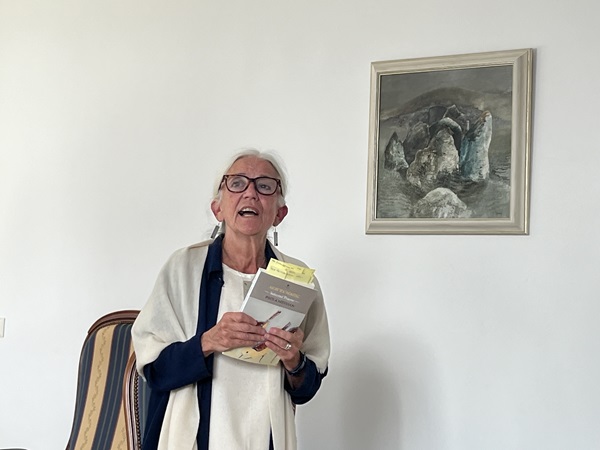 Irish poet, Paula Meehan;
Credit: Chronicle.lu
Irish poet, Paula Meehan;
Credit: Chronicle.lu
On Tuesday evening, 4 June 2024, Irish poet Paula Meehan was Guest of Honour at an event hosted by the Ambassador of Ireland to Luxembourg, Jean McDonald, at her residence.
Paula Meehan was awarded a BA from Trinity College, Dublin, and a Master of Fine Arts degree from Eastern Washington University in the US.
She has written poetry for film, for contemporary dance companies and for collaborations with visual artists; her poems have been put to music by songwriters (including Christy Moore) and composers; it has been extensively translated, including into French and German.
Around 30 people attended the reading which was the first of a short BeNeLux tour in collaboration with the Irish embassies in Brussels and Den Haag (The Hague), promoting Irish culture.
Ambassador McDonald welcomed everyone and said what a big fan of her poetry she was. She confirmed that Paula Meehan was recently awarded the esteemed Pigott Poetry Prize at the Listowel Writers' Week Literary Festival.
Paula Meehan commended the ambassador on the venue which she explained was most appropriate for such a poetry reading. She read from what she described as her back catalogue as well as including more contemporary works, some short and other longer excerpts.
She talked about the flexibility of English, tuning into the Latin, Viking or Anglo Saxon versions of the language. She talked about growing up in north inner city of Dublin which she revealed shaped her poetic journey, before moving out to Finglas when in her teens: here many young people were attracted to music bands and it was within this context that she started to write lyrics. She also talked about Aboriginals in Australia committing landscapes to memory by way of songs and their lyrics. She also addressed the structure of poetry and the free verse forms that she favours, as well as touching on climate change in the context of DNA, bears and migrations, as well as museums and the grandeur of Georgian architecture. In the context of the future of Irish poetry, she described culture as a vehicle for liberation and inclusion, using poetry as a mirror where people see their own education and physical standing.
The poetry reading was followed by an informal reception.








